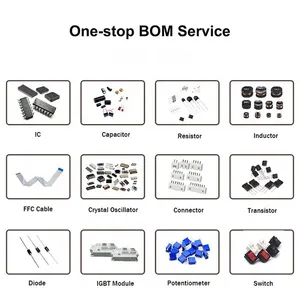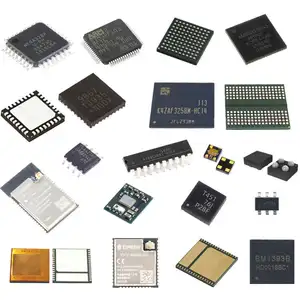(18169 products available)








































































































































































An 8 pin CPU power supply connector is a power supply connector used to deliver power to the central processing unit (CPU) of a computer. The connector consists of two 4-pin connectors that can be either joined or left separate, depending on the motherboard's requirements.
Here are some common types of 8-pin CPU power supplies:
Also known as the 8-pin CPU power supply, the 4+4 pin CPU power supply is a flexible power supply connector that can either work as an 8-pin EPS connector or two separate 4-pin connectors. It is meant to offer compatibility with older motherboards that require only a 4-pin CPU connector while also catering to newer motherboards that come with an 8-pin CPU power connector. Most modern power supplies come with the 4+4 pin CPU power connector to ensure it can work with both types of motherboards.
The 4-pin CPU power supply is an older connector mainly found in older systems. Unlike the 8-pin variant, this connector lacks a separate 12V rail. It is specifically designed for use with older motherboards that come with a 4-pin CPU power connector. Most modern power supplies do not come with a 4-pin CPU connector, but they can be used with a 4 to 8 pin CPU power adapter to power up older systems.
The 8-pin CPU power supply is a power connector designed to deliver power to the computer's CPU. Unlike the 4+4-pin variant, this connector is permanently fixed to the power supply. It features an 8-pin configuration, which means it can only be used with motherboards that come with an 8-pin CPU power connector. The connector is built to work with a 12V rail and is usually available in the form of an 8-pin EPS connector or a 4-pin plus 4-pin connector.
Other types of CPU power supplies include the 6-pin variant. Though not very common, the 6-pin CPU power connector can be used to deliver power to the CPU. It is designed for use with older motherboards that come with a 6-pin CPU power connector. To use this connector, one may require a 6-to-8-pin CPU power adapter to cater to the power requirements of the modern CPU.
Here are some common features of the 8 pin CPU power supply:
With the 8 pin CPU power supply, one can connect wires using modular cables instead of permanently fixed cables. A power supply with modular cabling only allows the connection of cables that are needed for a particular build. It comes with a range of cables in different lengths and configurations. This helps reduce cable clutter within the PC case.
SLI and CrossFire support is a feature of the CPU PSU that allows the connection of multiple graphics cards for increased performance. It requires a power supply with multiple PCIe connectors. The power supply should also be able to provide enough power to run the cards in parallel.
The size of the fan greatly affects the noise level and cooling of the PSU. A large fan is less noisy and offers better cooling.
Single rail power supply units have one or more 12-volt power rails. The 12-volt rail is a single power supply that powers all the PC components. On the other hand, multiple rail power supplies have two or more 12-volt rails. Each rail provides power to different components, such as the CPU, GPU, and drives. The PCI power supply has separate over-current protection, which may provide an added layer of protection for high-end systems. They also ensure that current is distributed evenly among the components.
The form factor of a power supply is the physical shape and size of the unit. The form factor of the CPU's power supply unit is determined by the type of motherboard. The most common form factor is the ATX form factor. It is suitable for most desktop computers. The ATX form factor PSU typically measures 150 x 86 x 140 mm or 6 x 3.4 x 5.5 inches. Some small form factor desktops use the SFX form factor PSU. It is smaller than the ATX form factor and usually measures 125 x 63.5 x 100 mm or 5 x 2.5 x 4 inches.
The 8 pin CPU power supply is required for computer systems to function. There are several ways it can be used, and some of them are listed below.
The gaming market is one of the largest contributors to the demand for CPUs. Gamers usually need high-performance computers to support games. Gamers can enjoy a smooth and seamless gaming experience if their computer has a multi-core processor that can handle complicated calculations and a dedicated graphics card. In addition to this, they will need a robust power supply to support their gaming rig, which includes multiple hard drives, PC fans, and lighting, among other things.
Workstations are often used in professional computer-aided design (CAD) programs, video editing software, and other demanding applications. These powerful computers require a stable and reliable power supply to support their high-performance components and ensure uninterrupted operation during intensive work tasks.
Servers are the backbone of modern computing infrastructure, responsible for hosting websites, storing data, running cloud services, and more. Servers require redundant power supplies to ensure high availability and uptime. Typical server configurations include Dual-CPU setups, and sometimes even Quad-CPU configurations, which require high-wattage power supplies to deliver the necessary power to all components and ensure stable operation 24/7.
Embedded systems are specialized computing devices that are part of a larger system, such as industrial automation equipment, medical devices, automotive systems, and more. These systems are usually designed for specific tasks and require a compact and reliable power supply to ensure uninterrupted operation in various environments.
Enthusiast PC builders are users who are passionate about building high-performance computers with custom water cooling loops, overclocked CPUs, and other advanced modifications. These users often require high-quality power supplies to ensure stable operation under demanding conditions and to support their customized builds.
Modern home entertainment systems often include gaming consoles, media streaming devices, and high-end televisions that require a stable power supply to deliver an optimal viewing and gaming experience. A robust power supply can help prevent issues like screen flickering or system crashes, providing a more enjoyable entertainment experience at home.
When choosing the 8-pin CPU power supply for bulk buying, it is important to ensure that it can provide reliable and stable power to the CPU. This is because the CPU is the most critical component of a computer. The 8-pin CPU power supply cable should also be long enough to reach the CPU connector on the motherboard. The length of the cable is usually between 300mm and 700mm. It is also important to consider the power requirements of the CPU. Different CPUs have different power requirements. The power supply unit should be able to provide the required power. It is also important to ensure that the 8-pin CPU power supply is compatible with the CPU and motherboard. This is because different CPUs and motherboards have different power connectors.
It is also important to consider the efficiency of the 8-pin CPU power supply. This is because an efficient power supply can help save energy and reduce electricity bills. The efficiency of the power supply is usually expressed as a percentage. 80 PLUS certification should be considered. An 80 PLUS certified power supply is more efficient than a non-certified one. It is also important to consider the form factor of the power supply. This is because different cases support different power supply form factors. Some common form factors include ATX, SFX, and TFX. The wattage of the power supply is also important. The power supply should be able to provide enough power to the CPU and other components.
When choosing the 8-pin CPU power supply for bulk buying, it is also important to consider the brand. Some brands are known for their quality and reliability. It is important to read reviews to know what other customers are saying about the product. The price should also be considered. However, it is important to avoid compromising quality for price. It is also important to compare prices from different suppliers to get the best deal.
Q1: What is an 8 pin CPU power connector?
A1: An 8 pin CPU power connector is a cable that connects the power supply to the computer's motherboard.
Q2: Can I use an 8 pin CPU power connector for other components?
A2: No, the 8-pin CPU power connector is specifically made for the CPU. Other parts of the computer have different power connectors.
Q3: How do I know if my CPU needs an 8-pin connector?
A3: The CPU's manual or specifications will tell the type of power connector it needs. If not, check the CPU's socket to see if it has an 8-pin power socket.
Q4: What is the difference between a 4-pin and 8-pin CPU power connector?
A4: The primary distinction between a 4-pin and 8-pin CPU connector is the number of pins. The motherboards of some computers require a 4-pin connector, while others may necessitate an 8-pin connector. The 8-pin connector, on the other hand, can handle more power than the 4-pin connector.